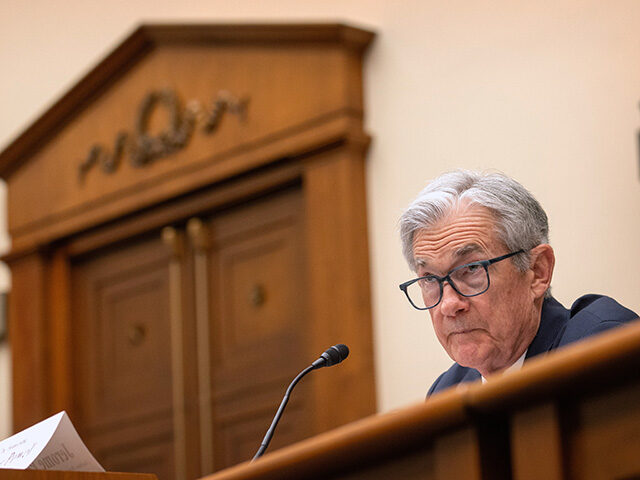Fed Moves to End ‘Reputational Risk’ Policies ‘Weaponized’ by Left to Debank

Federal Reserve Chairman Jerome Powell on Tuesday during a congressional hearing said the nation’s central bank felt compelled to address policies around “reputational risk,” noting that “debanking” is a “serious problem.”
The Fed Board said reputational risk would no longer be a part of its examination program while it supervises banks.
Conservatives, venture capitalists, and cryptocurrency companies have long complained about “debanking,” or losing access to one’s banking services due to the person or group’s commercial activity or political affiliation.
Rep. Bryan Steil (R-WI) during a House Financial Services Committee hearing, asked the Fed chairman why the Fed references reputational risk in its supervisory materials.
Powell remarked, “We’re hearing a lot of reports of debanking and that sort of thing. And over the course of 2024, we came to the view that this is a serious problem that we need to address. We said that publicly and now we’re doing this, and so are the other agencies.”
The Office of the Comptroller of the Currency (OCC) in March also said it would remove reputational risk from its examinations and guidance; the Federal Deposit Insurance Corporation (FDIC) is also reportedly doing the same.
Lawmakers also asked Powell about past actions by bank regulators that discouraged the banking sector from working with the cryptocurrency industry.
The Fed chairman said, “Banks are free to provide banking services to the crypto industry and crypto companies, and banks are also free to conduct crypto activities as long as they do so in a way that is protective of safety and soundness.”
Rep. Tim Moore (R-NC) asked Powell, “I appreciate the Federal Reserve’s announcement yesterday to end the use of reputational risk during banking examinations. This supervisory practice was used as a tool to pressure banks to refrain from offering financial services to politically disfavored individuals or industries. What further steps is the Federal Reserve taking to help usher in these changes, such as ending examination practices that informally encourage banks to close certain accounts without written justification?”
Powell noted that Fed Vice Chair Michelle Bowman is developing — a range of policies that will help in that area, and I should let her speak to it. But as you know, we’ve eliminated reputation risk, largely, in a thoughtful way from those things.
He added, “I think we became more aware of that problem over the course of last year and, like the other agencies decided to move away from that. We’re very conscious of the fact that we shouldn’t be telling banks who they can lend to. That’s a decision for them.”
However, not all everyone believes that the Fed has does everything it can to stop debanking.
Sen. Cynthia Lummis (R-WY), during a Senate Banking Committee hearing on Wednesday, said that the Fed has yet to repeal the Policy Statement on Section 9(13) of the Federal Reserve Act, which specifies that digital assets are unsafe and unsound.
“While Chairman Powell asserts that the Fed has taken significant steps to adopting a more balanced approach toward digital assets, the legacy of Operation Chokepoint 2.0 and the ramifications of these harmful policies persist,” Lummis said in a statement. “The Fed’s continued politization of bank supervision is a threat to both our financial system’s integrity and America’s competitive edge, and the days of the Fed hiding its policy bias and mismanagement are over.”
Breitbart News has reported about how the Biden administration has pushed to debank many industries in a similar fashion to the Obama administration:
This practice of debanking first became commonplace during President Barack Obama’s time in office through Operation Choke Point, which discouraged banks from doing business with gun sellers and payday lenders.
The Biden administration similarly warned financial institutions about the alleged risks of working with the crypto industry.
According to supervisory letters obtained by cryptocurrency exchange Coinbase via Freedom of Information Act requests, the Federal Deposit Insurance Corporation (FDIC) pressured banks to debank crypto companies.
The Blockchain Association, a crypto trade group, said it has identified more than 30 instances of debanking in the crypto industry.
During the early days of the administration, Trump called for “protecting and promoting fair and open access to banking services for all law-abiding individual citizens and private-sector entities alike.”
Will Hild, the executive director of Consumers’ Research, cheered the Fed’s move, saying in a statement:
The Fed’s announcement is a huge win for consumers. ‘Reputational risk’ has long been weaponized by the Left to punish those who don’t align with radical ESG objectives. It was the foundational justification of the now infamous Obama-era Operation Choke Point campaign, which kicked off the entire era of debanking. Such a vile practice is a blatant slap in the face to the First Amendment and should never have been tolerated. All financial institutions that allowed financial risk to be supplanted by political considerations should be held accountable. I applaud Chairman Powell for his effort to bring common sense back to business practices and protect consumers from unjust discrimination.
OJ Oleka, the CEO of the State Financial Officers’ Foundation, said:
The Federal Reserve’s announcement marks a major turning point in the fight against debanking and a plain recognition of reality: it is simply not a bank’s job to judge political popularity when doing business. So-called ‘reputational risk’ has been abused to serve as cover for outrageous discrimination and violations of Americans’ First Amendment rights. It’s a dangerous weapon that should’ve been discarded long ago. Financial risk alone should be a bank’s consideration, not compliance with the Left’s latest ideological preferences.
Oleka added, “Elected lawmakers in Congress should be motivated by today’s news to go further and take concrete legislative action to end political debanking permanently.”